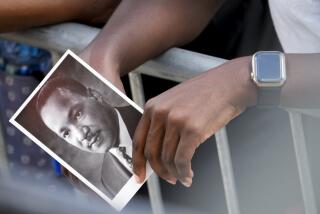Reagan Links His Policies to Record Black Prosperity
- Share via
WASHINGTON — As the first national holiday honoring the late Dr. Martin Luther King Jr. neared, President Reagan told a nationwide radio audience Saturday that the policies of his Administration have helped black Americans achieve a record-high level of prosperity.
“We still have a way to go” to reach racial equality in the country, Reagan said from the presidential retreat at Camp David, Md., where he is recuperating this weekend from the colon surgery he underwent Friday. The White House announced Saturday that laboratory evaluation showed that three intestinal polyps and a spot of facial tissue removed from Reagan “all are benign.”
In a broadcast response for the political opposition, Rep. William H. Gray III (D-Pa.), chairman of the House Budget Committee, challenged Reagan’s statements about black prosperity.
‘Massive Reductions’
Gray, who is a member of the Congressional Black Caucus, said Reagan’s efforts to trim the federal budget have resulted in Administration proposals for “massive reductions in aid to education for the disadvantaged and the handicapped.”
Black adult unemployment stands at 15.5%, a 3-point rise since 1978, and 42% of black families live in poverty, an increase from 32% in 1980, Gray said.
Reagan, in his address, said he shares King’s belief that “our country will never be completely free until all Americans enjoy the full benefits of freedom.”
“I think it’s fair to say that we’ve come a long way” since King was slain in 1968, the President said.
“We have a lot to be proud of but nothing to be complacent about,” he continued. “We still have a way to go.”
King’s birthday will be celebrated as a holiday Monday.
Rights Record Defended
Reagan, who has been criticized by some civil rights leaders as being insensitive to the concerns of black Americans, insisted that “vigorous enforcement of the civil rights laws continues.”
“More employment discrimination cases were filed by the Justice Department during our first Administration than during the previous four years (of the Jimmy Carter Administration),” he said.
“We’ve also continued strong support for the fair housing laws.”
Discussing what he called record economic progress for blacks, Reagan said that “record high employment, lower tax rates, lower inflation, dropping interest rates and continued economic growth have helped Americans--and that includes black Americans.”
He said that his policies over the last five years “have produced the biggest economic expansion since the 1960s” and that, “because of these policies, about 400,000 black Americans moved up and out of poverty from 1983 to 1984.”
Employment figures show that “a record 10.7 million black Americans are holding jobs,” the President said.
Minority Business Growth
In addition, Reagan said, “The number of black-owned businesses increased 47% between 1977 and 1982.” Over the last three years, minority businesses have received $15 billion in government work and have handled another $15 billion in orders from the private sector, he said.
In the Democratic rebuttal, Gray declared: “Mr. President, the minority businesses achieved that $15 billion while your Civil Rights Commission opposed all of the past laws and new laws to redress discrimination for minorities and women.”
Gray, a member of a congressional delegation that returned recently from a visit to South Africa, said the group “came away more convinced than ever before that Congress had done the right thing in cutting off economic support for apartheid last year and that, in 1986, we need to re-examine that policy.”
Gray said the trip convinced him that if King were alive today, he would be focusing much of his concern on South Africa.
“We found a government that denies the human and civil rights we in America take for granted--the right to work and live where we want, the right to vote in national elections, the right to have access to education and medical care.
“We have come a mighty long way,” Gray said. “But when you look at the facts, both here at home as well as abroad, we still have a long way to go to realize the dream of Dr. Martin Luther King.”
More to Read
Sign up for Essential California
The most important California stories and recommendations in your inbox every morning.
You may occasionally receive promotional content from the Los Angeles Times.










